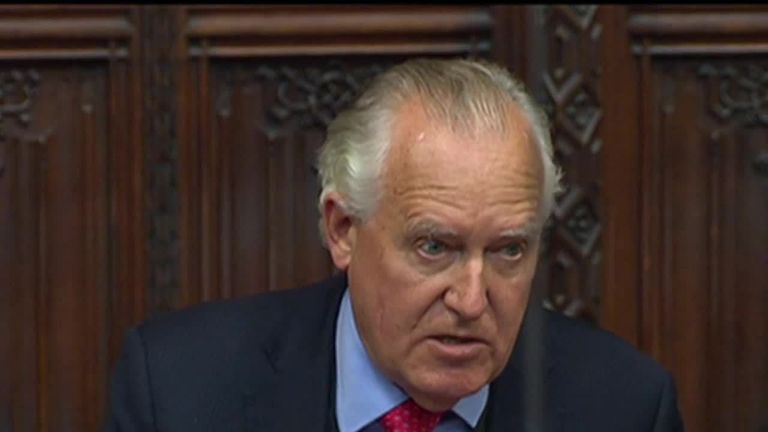Sir Philip Green ends court fight with Daily Telegraph
The tycoon accuses the newspaper of waging a 'vendetta', but the publisher argues there is a 'clear public interest' in the story.
Saturday 9 February 2019 04:26, UK
Sir Philip Green and the Daily Telegraph have ramped up their war of words, despite the tycoon formally dropping legal action against the newspaper over accusations of racism, sexual harassment and bullying.
Speaking after proceedings were wound up, the retail tycoon argued that non-disclosure agreements (NDAs) at the centre of the case remained in force.
But the publisher has gone ahead with plans to reveal further details of the allegations against Sir Philip. None of the accusers has been named.
The newspaper also reported that the Topshop owner is facing a legal bill of £3m after he was ordered to pay the bulk of its costs.
In a ruling on Friday, Mr Justice Warby said Sir Philip could end the litigation without any conditions attached.
The Telegraph's lawyers had previously asked the judge to impose restrictions to prevent the retail businessman from taking further legal action against the newspaper or any of its sources.
The court judgment detailed allegations made against Sir Philip including "unwanted contact of a sexual nature; general sexual harassment; racist language; and intimidation and bullying; many amounting to criminal offences".
Lawyers for the Telegraph had also described his conduct as "gross and unlawful", involving "habitual behaviour over a substantial period by an extremely wealthy and powerful man abusing his position".
Sir Philip has "categorically" denied any unlawful racist or sexual behaviour.
In a statement issued after the ruling, Sir Philip and the board of the Arcadia Group said the signatories to the non-disclosure agreements (NDAs) were under "ongoing obligations" to honour the agreements.
The statement continued: "The Telegraph has pursued a vendetta against Sir Philip Green and the employees and management of Arcadia Group for the past nine months, harassing many of its staff and their families in their homes, often at night and at weekends.
"The Telegraph and its owners must now decide whether to do the decent thing and respect the NDAs.
"If not, they will expose their sources to potential further legal actions and significant losses.
"Their fate is now in the Telegraph's hands."
In a statement, the Telegraph's editor Chris Evans said the newspaper maintains there is a "clear public interest" in telling people whether an employer has been accused of abuse.
He said: "The courts, for one reason or another, have not been able to resolve this issue.
"All those who were subject to NDAs after complaining of sexual misconduct and racial abuse remain subject to NDAs.
"Sir Philip has described the allegations against him as no more than banter. If that's so, he should release his accusers from their NDAs and allow them to speak freely."
Mr Evans added: "The prime minister has already indicated that she is uneasy with the way in which NDAs have been used. We ask her now to do something about it."
It was announced last week that Sir Philip was dropping the case because it was "pointless" after he was named in Parliament as the businessman behind an injunction against the newspaper.
The gagging order was sought after Sir Philip and an executive at his Arcadia firm were contacted by a Telegraph journalist in July last year.
The newspaper intended to publish allegations of misconduct made against Sir Philip by the employees - who all received substantial payments after settling their claims.
In all five cases, the employees had agreed to keep the details of their complaints confidential under non-disclosure agreements.
Although an injunction was initially refused, a challenge was lodged by Sir Philip - then identified in court papers as ABC - and two of his companies.
Court of Appeal judges temporarily barred the newspaper from identifying the businessman or revealing "confidential information" relating to allegations of misconduct made against him by five employees.
Outlining their decision for granting the injunction, they said there was a "real prospect" that publication would cause "substantial and possibly irreversible harm" to the claimants.
But Labour former cabinet minister Lord Hain named Sir Philip in the House of Lords two days after the court's ruling last October.
The Labour peer said he had been contacted by someone "intimately involved" in the case and felt it was his "duty" to use parliamentary privilege to identify the retail mogul.
Speaking to Sky News, he said: "Maybe you do sign a non-disclosure agreement and then you think afterwards, hang on, I've been really badly treated, I want to get some redress for this, I want to take it forward... and then you find you're gagged.
"That's not, in my view, a just or proper use of the law."





